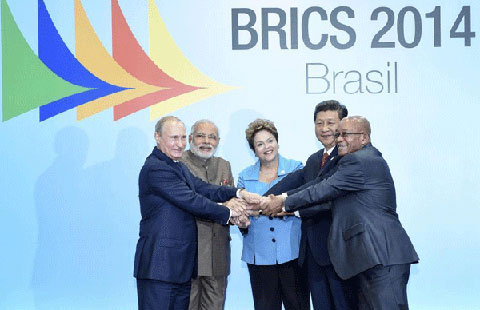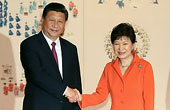Xi's Brazil visit bodes well
Updated: 2014-07-07 04:13
By BRUNA GAMA in Rio de Janeiro (China Daily Latin America)
Comments Print Mail Large Medium SmallChinese President Xi Jinping's visit to Brazil in mid-July highlights the strategic character of Brazil-China relations, an expert told China Daily in an exclusive interview.
Professor Severino Cabral, director-president of the Brazilian Institute for China and Asia-Pacific Studies, said Xi's visit to Brazil, the first since he became president, is significant.
"In his previous visit to Brazil, in February 2009, when he was vice-president, Xi Jinping indicated that China and Brazil should develop a cooperation that went beyond the bilateral relations, and had a global strategic influence. The current events reaffirm and corroborate the president's vision about the strategic character of China-Brazil relations," he said.
The visit marks the 40th anniversary of the establishment of diplomatic relations between China and Brazil. In the past four decades, relations between the two countries grew immensely, as did trade — China has been Brazil's largest trading partner since 2009, and China-Brazil commerce amounted to $83 billion in 2013.
Cabral said Brazil-China trade was in good shape. Brazil is a large provider of primary products such as iron ore, oil, grains and meat to China, and imports mostly manufactured goods. China is increasing its participation in oil exploration in Brazil, and two Chinese companies — CNPC and CNOOC — are part of the consortium that won the right to explore Libra, Brazil's largest oil field to date.
Still there is room for improvement, Cabral said, with the development of Brazil's industry. Even though he believes no country can compete with China when it comes to reduced industrial costs, that does not mean Brazil cannot diversify its exports to the Asian country and include high-tech goods as well.
"We sell high-technology manufactured goods to China, such as jet planes and vehicle parts," Cabral said. "The challenge is developing our industry in the fields in which there are repressed demands. China will become the largest importer in the world, surpassing the US and Europe. There will certainly be space for Brazilian industries in this huge market in construction, but we have to build our niche there."
BRICS, the bloc in which Brazil and China participate with Russia, India and South Africa, can be a big help on that front, he said. Brazil will host the sixth BRICS Summit on July 15-16. In fact, several BRICS leaders will be in the country even before that, as they are expected to attend the FIFA World Cup final in Rio on July 13.
One of the most important matters expected to be discussed in the summit is the creation of a BRICS Development Bank, an entity designed to promote development among the member countries and other developing nations.
According to Cabral, the BRICS bank can lead to the creation of incentive policies for the association with Chinese companies in South America, which can help Brazil inaugurate a new industrialization cycle.
In addition to the BRICS Bank, the five member countries are expected to tackle other issues as well. Last year, at the fifth summit in South Africa, the bloc took steps to improve cooperation with African countries. This year, the same thing is expected to be done in regards to Latin American and Caribbean countries.
"Taking advantage of this situation, the Chinese president's state visit will be completed by a meeting with the leaders of the Community of Latin American and Caribbean States, in which dialogue on the cooperation between China and Latin America and the Caribbean should be deepened," Cabral said.
The perspectives are good, Cabral believes, and there is a lot of potential for growth in Brazil-China relations.
"I think the future of Brazil-China relations will be brilliant, because these are two of the biggest emerging countries in the world and certainly two supporters of peace and international stability, which converge in the defense of the prevalence of the principles of respect to sovereignty, independence and territorial integrity," he said.
Contact the writer at readers@chinadailyusa.com.





